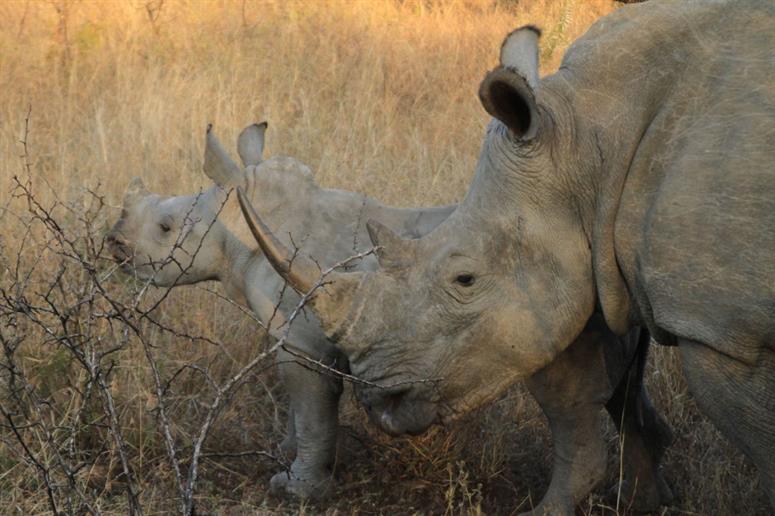Rhino Press tour
Several articles published by journalists joining the tour:

28th of August - 2nd September 2016
On the black market, rhino horn can sell for an astounding US$60,000 per kilogram. This means that a local poacher can walk away with around R200-300,000 for slaughtering a rhino in one of our game reserves or parks. No wonder then that more than 6000 rhino has been killed since 2009, with the unofficial tally for 2016 currently standing at approximately 700 for the year so far. (A staggering 2 390 rhinos were killed in 2014/15, which constitutes more than 10% of the total global population of these gentle pachyderms).
Understandably rhino conversation is one of the hottest topics of wildlife conservation globally with the largest rhino population existing in Southern Africa. Running up to 17th Conference of the Parties (COP17) to the Convention on International Trade in Endangered Species of Wild Fauna and Flora (CITES) where the legalisation of rhino horn trade was proposed, we decided to fund and facilitate a tour to seek first-hand insight from conservation specialists, rhino custodians and wildlife and park management as well as the rangers on the front-line keeping the rhinos safe and alive. Some of these instrumental stakeholders included; John Hanks, Pelham Jones, John & Albina Hume, Ted Reilly, Xolani Nicholus Funda, Musa Mntambo, David Cook, Cedric Coetzee, Jabulani Ngubane and John Forrest among several others.
John Hanks, a renowned conservationist, assisted us in selecting a group of local journalists from major broadsheets that were joined by media specialists from the UK and USA, as well as an independent filmmaker from India. The tour provided a platform on which the journalists and stakeholders could delve into conversations around rhino horn trade and the future protection of the rhino population in Swaziland and South Africa.
The journalists were given the opportunity, based on the stakeholders input as well as from their first hand experience, to generate balanced reporting to reflect (or where necessary disprove) current thinking.
Interestingly, many of the stakeholders encountered on the tour agree indisputably that the current thinking around rhino conservation must change in order to ensure the survival of the species. This is a contentious issue, but the one thing that has become abundantly clear is that the arguments against the legal trade in rhino horn need to be reconsidered. The journalists who attended the tour have published some exceptional articles. Some of them can be found below:
Understandably rhino conversation is one of the hottest topics of wildlife conservation globally with the largest rhino population existing in Southern Africa. Running up to 17th Conference of the Parties (COP17) to the Convention on International Trade in Endangered Species of Wild Fauna and Flora (CITES) where the legalisation of rhino horn trade was proposed, we decided to fund and facilitate a tour to seek first-hand insight from conservation specialists, rhino custodians and wildlife and park management as well as the rangers on the front-line keeping the rhinos safe and alive. Some of these instrumental stakeholders included; John Hanks, Pelham Jones, John & Albina Hume, Ted Reilly, Xolani Nicholus Funda, Musa Mntambo, David Cook, Cedric Coetzee, Jabulani Ngubane and John Forrest among several others.
John Hanks, a renowned conservationist, assisted us in selecting a group of local journalists from major broadsheets that were joined by media specialists from the UK and USA, as well as an independent filmmaker from India. The tour provided a platform on which the journalists and stakeholders could delve into conversations around rhino horn trade and the future protection of the rhino population in Swaziland and South Africa.
The journalists were given the opportunity, based on the stakeholders input as well as from their first hand experience, to generate balanced reporting to reflect (or where necessary disprove) current thinking.
Interestingly, many of the stakeholders encountered on the tour agree indisputably that the current thinking around rhino conservation must change in order to ensure the survival of the species. This is a contentious issue, but the one thing that has become abundantly clear is that the arguments against the legal trade in rhino horn need to be reconsidered. The journalists who attended the tour have published some exceptional articles. Some of them can be found below:

CITES Upholds Rhino Horn Trade Ban; But Will This Reduce Rhino Poaching? : Article by John Frederick Walker in "National Geographic"
Rhino horn & conservation: to trade or not to trade, that is the question? : Article by Keith Somerville in "The Conservation"
Rhino poaching in South Africa: are numbers falling or focus shifting? : Article by Keith Somerville in "The Conservation"
Dehorning rhinos: why there may be a case for doing it : Article by Keith Somerville in "The Conservation"
To save our rhinos, we need a legal horn trade : Article by Keith Somerville in "The Ecologist"
The Horns of a Dilemma (video) : Video by Swati Thiyagarajan
The world's largest rhino breeder : Article by Tony Carnie
Baby Rhino in Swaziland : Photos by Jacques Marais

